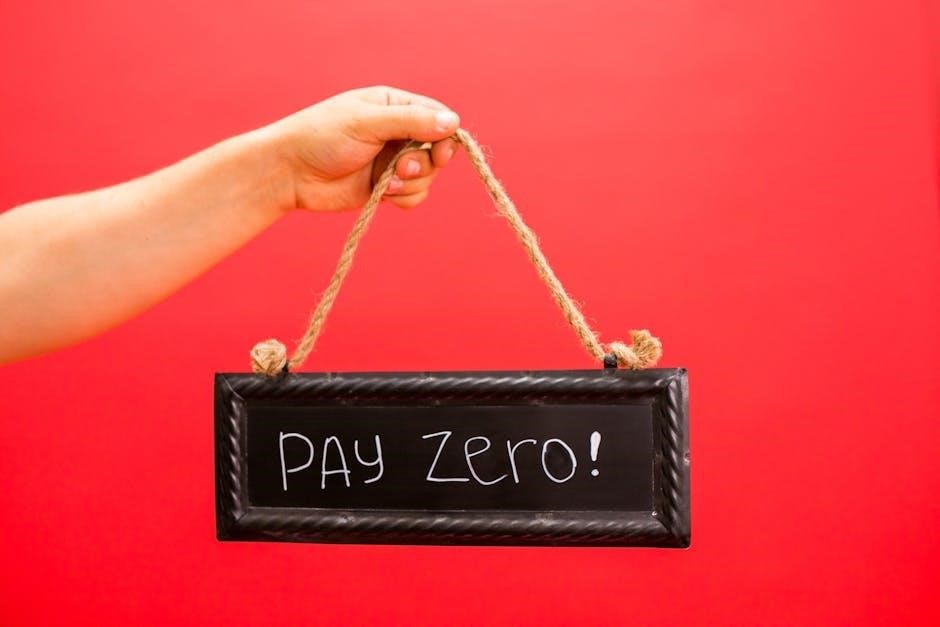Dave Ramsey’s Zero-Based Budget is a powerful financial tool that ensures every dollar earned is intentionally allocated‚ promoting financial control and debt reduction through disciplined planning.
What is a Zero-Based Budget?
A zero-based budget is a financial planning method where every dollar earned is intentionally assigned to a specific expense or savings goal. This approach ensures that income minus expenses equals zero‚ leaving no unallocated funds. It requires careful categorization of all expenses‚ ensuring that every dollar is accounted for and purposefully spent. This method promotes financial responsibility‚ reduces debt‚ and helps individuals align their spending with their financial goals‚ fostering greater control over their money.
The Importance of Budgeting in Financial Planning
Budgeting is essential for gaining control over finances and achieving long-term goals. It helps individuals track income and expenses‚ ensuring money is allocated purposefully. A well-planned budget aligns spending with financial objectives‚ reducing debt and increasing savings. Without a budget‚ managing expenses can become chaotic‚ leading to financial instability. Dave Ramsey emphasizes that budgeting is the cornerstone of financial success‚ enabling individuals to make intentional decisions and avoid unnecessary debt. By prioritizing needs over wants‚ budgeting fosters discipline and accountability‚ setting the stage for lasting financial stability.
Overview of Dave Ramsey’s Financial Philosophy
Dave Ramsey’s financial philosophy revolves around disciplined budgeting‚ debt elimination‚ and building wealth through intentional spending. He advocates for creating a zero-based budget to ensure every dollar is assigned a purpose. Ramsey’s Baby Steps program guides individuals from establishing an emergency fund to investing for retirement. His approach emphasizes financial education‚ accountability‚ and avoiding debt‚ promoting long-term financial stability and freedom. By focusing on needs over wants and prioritizing debt repayment‚ Ramsey’s methods empower individuals to achieve financial independence and secure their future.

Key Principles of a Zero-Based Budget
A zero-based budget ensures every dollar is intentionally allocated‚ with income minus expenses equaling zero‚ promoting financial discipline‚ debt reduction‚ and savings growth through mindful spending.
Allocating Every Dollar to a Category
In a zero-based budget‚ every dollar earned is assigned a specific purpose‚ ensuring no money is left unaccounted for. This principle requires intentional spending‚ where each dollar is “given a job‚” whether for bills‚ savings‚ or debt repayment. By allocating every dollar to a category‚ individuals avoid wasteful spending and ensure their financial goals are prioritized. This method promotes accountability and forces a reevaluation of expenses‚ helping to align spending with financial priorities and values. It’s a cornerstone of Dave Ramsey’s approach to achieving financial stability and success.
Prioritizing Needs Over Wants
Prioritizing needs over wants is fundamental to Dave Ramsey’s zero-based budget. This principle ensures that essential expenses‚ such as housing‚ utilities‚ and food‚ are addressed before discretionary spending. By distinguishing between necessities and desires‚ individuals can allocate resources more effectively‚ reducing debt and building savings. This approach aligns with Ramsey’s emphasis on financial discipline and long-term stability‚ helping individuals achieve their monetary goals by focusing on what truly matters.
Regular Budget Reviews and Adjustments
Regular budget reviews and adjustments are crucial for maintaining financial alignment with changing circumstances. Dave Ramsey emphasizes that a zero-based budget is not static; it requires monthly evaluations to ensure accuracy and relevance. By reassessing income‚ expenses‚ and priorities‚ individuals can make necessary tweaks to stay on track. This iterative process helps identify areas for improvement‚ ensuring that every dollar continues to serve a purpose. Adjusting the budget regularly fosters financial flexibility and accountability‚ key to achieving long-term monetary goals.

Benefits of Using a Zero-Based Budget
A zero-based budget empowers you to assign purpose to every dollar‚ aligning spending with financial goals‚ reducing debt‚ and growing savings for lasting financial confidence.
Increased Financial Awareness
A zero-based budget significantly enhances financial awareness by requiring you to track and assign roles to every dollar‚ ensuring no income goes unaccounted for. This method forces you to evaluate spending habits‚ align expenses with priorities‚ and make intentional decisions about money allocation. By following Dave Ramsey’s approach‚ individuals gain clarity on where their money goes‚ fostering better financial discipline and accountability. This heightened awareness is key to achieving long-term financial stability and success‚ making it a cornerstone of Ramsey’s budgeting philosophy.
Debt Reduction and Savings Growth
Dave Ramsey’s Zero-Based Budget is highly effective for debt reduction and savings growth. By allocating every dollar to specific categories‚ individuals can prioritize debt repayment and savings‚ ensuring no money is wasted. This approach helps users pay off debts faster and build an emergency fund‚ aligning expenses with financial goals. The zero-based method prevents money from being unallocated‚ ensuring maximum progress toward debt elimination and savings accumulation. Over time‚ this disciplined approach leads to significant financial improvements and long-term stability‚ making it a key strategy in Ramsey’s budgeting system.
Improved Control Over Spending Habits
Dave Ramsey’s Zero-Based Budget helps individuals gain improved control over spending habits by ensuring every dollar is intentionally allocated. This method prevents money from being wasted on unnecessary expenses‚ as it forces users to account for every dollar. By prioritizing needs over wants and regularly reviewing expenses‚ individuals develop greater awareness of their spending patterns. This disciplined approach fosters better financial discipline‚ reduces impulse purchases‚ and aligns spending with long-term financial goals. Over time‚ it empowers users to make intentional‚ goal-oriented decisions with their money.

How to Create a Zero-Based Budget
Start by calculating total income‚ categorizing expenses‚ and assigning specific amounts to each category. Ensure income minus expenses equals zero‚ giving every dollar a purpose.
Step 1: Calculate Total Income
Calculating total income is the first step in creating a zero-based budget. Add up all sources of income‚ including paychecks‚ side hustles‚ and any additional earnings. This step ensures you have a clear picture of how much money you have to work with each month. Accuracy is key‚ as every dollar must be accounted for in your budget. By starting with your total income‚ you establish a foundation for allocating funds to various categories‚ ensuring no money goes unassigned. This step is crucial for maintaining financial discipline and achieving your budgeting goals. Use the Dave Ramsey zero-based budget PDF guide for detailed instructions.
Step 2: Categorize Expenses
Categorizing expenses is the next step in creating a zero-based budget. Common categories include housing‚ utilities‚ food‚ transportation‚ insurance‚ and debt repayment. This step helps organize spending into manageable groups‚ making it easier to allocate funds purposefully. By defining clear categories‚ you can better understand where your money goes and ensure every dollar serves a specific purpose. This process aligns with Dave Ramsey’s approach to intentional spending and financial control. Proper categorization sets the stage for assigning dollar amounts in the next step.
Step 3: Assign Dollar Amounts to Each Category
Assigning specific dollar amounts to each category ensures every dollar has a purpose. Start by allocating funds based on priorities and financial goals‚ adjusting as needed to reflect your spending habits and needs. This step requires careful planning to ensure no category is overlooked. By assigning exact amounts‚ you maintain control over your finances and align your spending with your priorities. This process helps create a balanced budget where every dollar is intentionally directed‚ aligning with Dave Ramsey’s zero-based budget principles.
Step 4: Ensure Income Minus Expenses Equals Zero
This final step ensures every dollar is accounted for‚ leaving no surplus. If income exceeds expenses‚ allocate the remaining amount to savings‚ debt repayment‚ or other priorities. Dave Ramsey emphasizes that a successful zero-based budget assigns a purpose to every dollar‚ ensuring no money is left unallocated. This step prevents overspending and ensures financial discipline. By achieving a zero balance‚ you maintain control over your finances and align your spending with your goals‚ as outlined in Dave Ramsey’s budgeting method.

Dave Ramsey’s Recommended Budget Categories
Dave Ramsey recommends organizing expenses into categories like housing‚ transportation‚ food‚ insurance‚ and debt repayment. These categories help prioritize spending and ensure intentional allocation of funds.
Housing Expenses
Housing expenses are a critical category in Dave Ramsey’s Zero-Based Budget‚ typically representing the largest portion of monthly spending. This category includes rent‚ mortgage payments‚ property taxes‚ and insurance.
According to Ramsey‚ housing costs should not exceed 28% of your total income to avoid financial strain.
By allocating funds specifically for housing‚ you ensure stability and prevent overspending in this essential area.
Transportation Costs
Transportation costs are a significant part of Dave Ramsey’s Zero-Based Budget‚ covering car payments‚ insurance‚ gas‚ and maintenance.
Ramsey emphasizes avoiding high-interest debt on vehicles to reduce financial burden.
By allocating funds specifically for transportation‚ you ensure stability and avoid overspending.
Proper budgeting in this category helps maintain financial control and aligns with long-term money goals.
Food and Dining
Food and dining expenses are a key category in Dave Ramsey’s Zero-Based Budget‚ focusing on allocating funds for groceries‚ dining out‚ and takeaways;
By prioritizing needs over wants‚ you can reduce unnecessary spending on eating out.
Creating a meal plan and using coupons can help lower grocery bills.
Ramsey suggests tracking every food-related expense to ensure money is used intentionally.
This approach helps maintain financial discipline and aligns with broader money goals.
- Plan meals to avoid impulse purchases.
- Set realistic limits for dining out.
- Use budgeting apps to track food expenses.
Insurance and Healthcare
Insurance and healthcare expenses are essential in Dave Ramsey’s Zero-Based Budget‚ ensuring protection against unforeseen medical costs.
Allocating funds for health insurance premiums‚ out-of-pocket expenses‚ and potential emergencies is crucial.
Ramsey emphasizes saving for healthcare needs to avoid debt from medical emergencies.
Regularly reviewing insurance plans can help identify cost-saving opportunities‚ aligning with financial goals.
- Budget for health insurance premiums monthly.
- Allocate funds for out-of-pocket medical expenses.
- Set aside savings for unexpected healthcare needs.
Debt Repayment
Debt repayment is a critical component in Dave Ramsey’s Zero-Based Budget‚ helping individuals eliminate financial burdens.
By allocating specific amounts to debt‚ you tackle high-interest loans and credit cards aggressively.
Ramsey’s Debt Snowball method suggests paying off smaller debts first for motivational wins.
Assigning every dollar to debt ensures progress toward financial freedom. Regular reviews help adjust payments as needed.
- Prioritize high-interest debt for faster payoff.
- Use the Debt Snowball method for motivation.
- Adjust payments as income or expenses change.
Tools and Resources for Zero-Based Budgeting
Explore essential tools like free budgeting templates‚ digital budgeting apps‚ and customizable spreadsheets to effectively manage your zero-based budget. These resources simplify tracking and organizing expenses‚ ensuring every dollar is allocated purposefully.
Free Budgeting Templates
Free budgeting templates are an excellent starting point for implementing a zero-based budget. These templates‚ often available in Google Sheets or downloadable formats‚ provide a structured framework for categorizing expenses and assigning dollar amounts. Many templates are designed to align with Dave Ramsey’s financial principles‚ ensuring every dollar has a purpose. They are user-friendly‚ customizable‚ and ideal for those new to budgeting. By using these tools‚ individuals can track spending‚ reduce debt‚ and achieve financial goals more effectively. They are simple‚ accessible‚ and a great way to stay consistent with budgeting efforts.
Digital Budgeting Apps
Digital budgeting apps offer a modern and convenient way to manage finances using the zero-based budget method. Apps like YNAB (You Need A Budget) and others provide tools to track expenses‚ assign jobs to every dollar‚ and set financial goals. They sync with bank accounts‚ making it easy to monitor spending in real-time. These apps often include features like automated savings‚ debt tracking‚ and customizable categories. By leveraging technology‚ users can stay disciplined and achieve better control over their finances‚ aligning with Dave Ramsey’s principles of intentional spending and debt reduction.
Spreadsheets for Custom Budgeting
Spreadsheets are versatile tools for creating a zero-based budget‚ offering customization to suit individual needs. Google Sheets and Excel are popular choices‚ allowing users to design budgets with specific categories‚ formulas for calculations‚ and real-time updates. These spreadsheets enable precise tracking of income and expenses‚ ensuring every dollar is assigned a purpose. Many templates are available online‚ aligning with Dave Ramsey’s method‚ making it easier to implement and stick to a zero-based budget for effective financial management and goal achievement.

Case Studies and Success Stories
Individuals and families have achieved significant debt elimination and savings growth using Dave Ramsey’s zero-based budget. Real-life examples highlight how disciplined budgeting transforms financial stability and security.
Real-Life Examples of Zero-Based Budgeting
Many individuals have successfully implemented Dave Ramsey’s zero-based budget‚ achieving significant financial milestones. For instance‚ a family earning $5‚000 monthly allocated $500 to giving‚ $650 to food‚ and $1‚250 to housing‚ ensuring every dollar was assigned. By prioritizing expenses and adhering to the budget‚ they eliminated $1‚000 in monthly debt payments. This disciplined approach not only reduced financial stress but also built savings and improved long-term financial stability. Such real-life examples demonstrate how zero-based budgeting can transform financial habits and lead to lasting success.
How Others Achieved Financial Success
Countless individuals have transformed their finances using Dave Ramsey’s zero-based budget. By assigning every dollar to a specific category‚ many have paid off debt and built substantial savings. For example‚ a couple earning $4‚500 monthly allocated 30% to housing‚ 10% to utilities‚ and 15% to debt repayment‚ erasing $20‚000 in loans within two years. This disciplined approach‚ combined with Ramsey’s Baby Steps‚ has empowered people to achieve financial freedom‚ reduce stress‚ and gain confidence in their money management skills‚ proving the effectiveness of zero-based budgeting.

Common Challenges and Solutions
Unexpected expenses and sticking to the budget long-term are common challenges. Allocating a buffer for emergencies and conducting regular budget reviews can help maintain financial discipline and adaptability.
Unexpected Expenses and Adjustments
Unexpected expenses‚ like car repairs or medical bills‚ can disrupt even the best-laid budgets. Dave Ramsey’s zero-based budgeting approach recommends creating a buffer category for emergencies. When unforeseen costs arise‚ the budget must be adjusted by reallocating funds from other categories. This ensures no expenses go unaccounted for. Regular reviews help identify areas to adjust‚ maintaining financial control and preventing debt. By prioritizing needs and adjusting as needed‚ individuals can navigate unexpected expenses without derailing their financial goals.
Sticking to the Budget Long-Term
Sticking to a zero-based budget requires discipline‚ accountability‚ and consistent tracking. Dave Ramsey emphasizes regular budget reviews to ensure alignment with financial goals. By automating savings and expenses‚ individuals can maintain consistency. Celebrating milestones‚ like debt repayment‚ helps stay motivated. Over time‚ the budget becomes a habit‚ fostering long-term financial stability and reducing the temptation to overspend. Accountability‚ whether through a partner or budgeting apps‚ is key to sustaining the process and achieving lasting financial success.
Dave Ramsey’s Zero-Based Budget is a transformative approach to financial management‚ offering clarity‚ control‚ and long-term stability. By allocating every dollar intentionally‚ individuals achieve their financial goals effectively.
The Long-Term Impact of Zero-Based Budgeting
Zero-Based Budgeting fosters long-term financial stability by encouraging disciplined spending and saving habits. Over time‚ it helps individuals achieve significant debt reduction and grow their savings consistently. This method prevents financial setbacks by ensuring every dollar is purposefully allocated. By maintaining this practice‚ people gain better control over their money‚ reducing financial stress and building a secure future. The long-term benefits include improved financial awareness‚ lasting debt elimination‚ and the ability to achieve long-term goals‚ ultimately leading to a more stable and prosperous life.
Encouragement to Start Budgeting Today
Starting a budget is the first step toward taking control of your finances. With a Zero-Based Budget‚ you can transform your financial future by making intentional decisions about your money. It’s easy to begin‚ and the long-term rewards of debt reduction‚ savings growth‚ and financial peace make the effort worthwhile. Don’t wait—start today and stay committed to your financial goals. Every dollar allocated brings you closer to stability and success. Take charge now and build the future you’ve always wanted.



